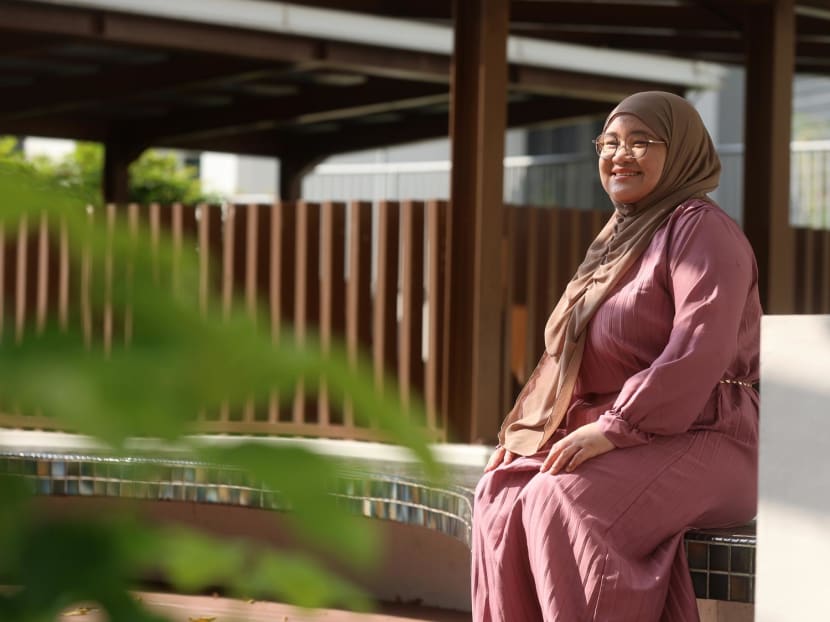The Stories Behind: This Malay-Muslim woman shows outsiders how she broke into the cliquey tech sector

Ms Ainul Md Razib (pictured), a software engineer, actively posts on TikTok about coding, jobs in the technology field, as well as career advice for the young.
SINGAPORE— When she was 17 and a junior college student, Ms Ainul Razib was engrossed in the world of manhwa (Korean comics) and fervently wrote fanfiction about the characters in the comics and posted it on her Tumblr account.
Then, an accidental click on the HTML button of Tumblr’s interface opened up an entirely new world for her.
Tumblr is a microblogging and social networking platform for posting and interacting with multimedia content and blogs. The HTML button allows users to view and edit the underlying code for advanced customisation.
This fascinated Ms Ainul, now 26, who shared with TODAY how she went down a rabbit hole of learning to code and how to customise her Tumblr page.
Sitting across from Ms Ainul in a cafe on a recent Tuesday morning, I couldn't help but be struck by her infectious enthusiasm and passion, which come off just as strongly in person as they do on her TikTok account, where she posts videos to demystify the technology industry for Malay-Muslim women such as herself or anyone else.
“Two things that stood out to me about coding are that there are specific steps and a process,” Ms Ainul said over the whirl of the coffee machines and vigorous tamps on the counter by baristas.
“Another thing about programming or coding is that when something goes wrong, it usually goes wrong, like, immediately so you have to troubleshoot it,” she said, her voice brimming with excitement.
Sipping on matcha latte, she added that this immediacy and the problem-solving nature of coding suited her well.
Dressed in soft shades of pink, Ms Ainul said that many people associate coding with heavy-duty and often mystifying topics such as machine learning, artificial intelligence, Web3 and crypto.
While that is true, coding can be “as simple as designing a pretty website, like formatting your text”, she added.
Once she learnt the basics of JavaScript code (a coding language), Ms Ainul added a Google translate plugin to her Tumblr page that could translate her writings into any language.
“It was a lot of work for barely any followers (on Tumblr), but at that point, it was mainly for exposure, right?”
Fast-forward almost 10 years and Ms Ainul is now a software engineer at a global company and has a TikTok account that boasts more than 75,000 followers.
One of her videos about breaking into tech took in more than 1.7 million views and nearly 250,000 likes.
Ms Ainul also regularly goes "live" on TikTok to answer any burning questions that anyone in her community and beyond might have about breaking into the tech industry in Asia.
Although she told TODAY that her time at university was no walk in the park, her parents’ support and early exposure to technology gave her the confidence to pursue a career in tech. She learnt about information systems, essentially a bachelor degree course in engineering
“My parents didn’t prescribe gender-specific careers for me,” Ms Ainul said.
However, they did not shy away from wanting their daughter to pursue the usual slew of "Asian parents' dream jobs for their children" such as being a doctor, lawyer, or engineer, she quipped, as we commiserated with equal parts exasperation and affection.
Even then, it was hard for Ms Ainul to imagine herself in a tech role, seeing as very few women who looked like her were pursuing a similar career path.
“Statistically speaking, I’m Malay, Muslim and female. So there aren’t many of us working in tech,” she said, calling herself a “triple minority”.
“At some point, I realised I can be part of that change, which sounds very inspirational, but it’s essentially me being impatient.”
‘OUTCLASSED’ AND LATE TO CODING
When Ms Ainul entered her first coding class at Singapore University of Technology and Design in 2017, she felt an immense pressure to perform as well as other students.
“There was definitely the pressure of being late to coding.
“Some of the people in my class were already legends. They already knew how to code when they were in National Service.”
While it was a dream come true for Ms Ainul, who majored in information systems, to be immersed in the world of coding, her other “big goal” was to graduate with a job offer.
However, it seemed as if the odds were continually stacked against her.
“I already felt so far behind and there were classmates in my class who seemed to get it right off the bat.
"I realised that not only was I learning slowly, I was already far behind in terms of networking and my knowledge.”
It was a tough pill to swallow for the aspiring software engineer, but she decided that she was not going to get the “best grades”; instead, she would aim to get the job.
I found it refreshing that Ms Ainul was so forthright about her challenges; being on social media often means having to maintain a shiny veneer, but she was not shy about the bumps along the way.
Ms Ainul took every opportunity to connect with her career advisers and dived into career fairs and networking events.
Whether it was rubbing elbows with tech professionals or pitching her skills to recruiters, she was always in the thick of it, keeping her eye on the prize.
She estimated that she attended at least seven networking sessions and still attends at least two or three events a year.
As for that period of her life, she described it as being in “survival mode” where she grappled with seeing her peers get converted to full-time jobs and felt like she had imposter syndrome, thinking she was not good enough.
There were many moments where Ms Ainul was on the verge of giving up and was “seriously thinking” of switching careers if all her efforts did not pan out.
Then, in December 2019, just before the Covid-19 pandemic hit, she got a job offer as a full-stack developer before she graduated.
A full-stack developer is someone who handles both the front-end (user interface) and back-end (server, database) aspects of web development.
BREAKING INTO THE WORLD OF TECH
Like most people who turned to TikTok during the pandemic, Ms Ainul used the video-sharing platform to stave off boredom.
It started with dance videos before she realised the growing interest that people had in tech and decided to share how she got her start.
She was on to something: I had to admit to her that I didn't know the difference between a product manager and a backend engineer, much less how one can get such jobs.
For all its glittering, pristine exterior, the tech world’s inner workings remain a mystery to many outsiders.
Ms Ainul’s content was also unique in that it focused on breaking into the tech industry in Asia, unlike most online content, which centres on the American tech scene.
The video that took off was one of her sharing tips about resumes that got her interviews at big tech companies. The video has amassed more than 300,000 views.
After that, she started sharing more about pay transparency, what it is like working in a tech firm once you are there, and navigating the workspace as a person from a minority community.
Ms Ainul’s social media presence was how her current manager, Mr Asmi Razali, found and hired her. He was following her programming lessons on TikTok, and when he learnt that she was looking for a job, he asked his talent team to reach out to her on networking site LinkedIn.
Mr Asmi, who spoke highly of Ms Ainul’s abilities and her willingness to learn and grow professionally, said: “It’s one of the best hiring decisions that I made.”
Of her side hustle as an advocate and TikTok content creator, Mr Asmi is in full support of that.
He told TODAY: “I love that she is using TikTok as a platform to connect with aspiring individuals who want to pursue a career in tech."
He added that using TikTok for advocacy work "can be a powerful tool to raise awareness and foster meaningful connections with those who are interested in tech”.
Ms Ainul said that there is a perception of coding or programming — that “all you have to do is sit at a computer, write code and go back home”.
She said that could not be further from the truth. Working in the tech sector means honing your communication skills more than before.
She explained: “It isn’t just one person building an entire system. It is multiple people building small parts of a bigger system.
“You will end up working with many different people, you’re not just staring at the computer.”
AN ADVOCATE FOR THE MALAY-MUSLIM COMMUNITY
More than demystifying how the tech world operates, paving the way for other Malay-Muslim women who are interested in tech lies at the heart of the work she does.
Ms Ainul said it is not that minority members of the wider community are not interested in tech; it is that “the tech community isn’t as open to the minorities”.
She spoke candidly about being a member of a minority community in the tech scene and although she has not received any nasty comments at her workplace, she has received some online.
“I have people calling me a diversity hire, that I got in on daddy’s money, which is weird because I’m not rich.”
Still, it all seems worth it when young people walk up to her during networking events to tell her how much they see themselves reflected in her.
Mr Asmi said: “For those who are preparing to pursue a career in tech, seeing people like themselves who have successful tech jobs can inspire them. This can help bridge the diversity gap by encouraging more diverse talent to enter the field.”
Ms Ainul, who also volunteers as a mentor with Malay-Muslim organisations here such as Mendaki, said: “We are changing the idea that if youths are from a certain demographic, they can only go for certain careers.”
She knows that the work is far from done.
“I think the issue is how can we truly pull (the minorities) in and keep them in the industry so that we can change this on a societal level, but that’s the challenging part.”








